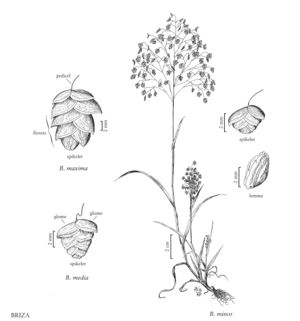Difference between revisions of "Briza media"
FNA>Volume Importer |
imported>Volume Importer |
||
| (8 intermediate revisions by 2 users not shown) | |||
| Line 4: | Line 4: | ||
|publications= | |publications= | ||
|common_names=Perennial quakinggrass;Amourette commune;Amour du vent | |common_names=Perennial quakinggrass;Amourette commune;Amour du vent | ||
| + | |special_status={{Treatment/ID/Special_status | ||
| + | |code=I | ||
| + | |label=Introduced | ||
| + | }} | ||
|basionyms= | |basionyms= | ||
|synonyms= | |synonyms= | ||
| Line 16: | Line 20: | ||
-->{{Treatment/Body | -->{{Treatment/Body | ||
| − | |distribution=Maine;N.H.;Del.;Md.;Mass.;N.Y.;Calif.;Mich.;Ala.;Conn.;Vt.;Pa.;Colo.;Nfld. | + | |distribution=Maine;N.H.;Del.;Md.;Mass.;N.Y.;Calif.;Mich.;Ala.;Conn.;Vt.;Pa.;Colo.;Nfld. and Labr. (Labr.);N.S.;Ont.;R.I. |
| − | |discussion=<p>Briza media is native to chalk and clay grasslands of Europe. It grows in acid to calcareous soils in moist to somewhat dry, sunny conditions, in meadow floodplains, forest clearings, old meadows, and pastures. It is often grown as an ornamental, and can colonize artificial habitats such as roadsides, but does not appear to invade recently disturbed locations. In the Flora region, it is most abundant in eastern North America, and is found in a few widely scattered locations elsewhere.</p> | + | |discussion=<p><i>Briza media</i> is native to chalk and clay grasslands of Europe. It grows in acid to calcareous soils in moist to somewhat dry, sunny conditions, in meadow floodplains, forest clearings, old meadows, and pastures. It is often grown as an ornamental, and can colonize artificial habitats such as roadsides, but does not appear to invade recently disturbed locations. In the Flora region, it is most abundant in eastern North America, and is found in a few widely scattered locations elsewhere.</p> |
|tables= | |tables= | ||
|references= | |references= | ||
| Line 26: | Line 30: | ||
-->{{#Taxon: | -->{{#Taxon: | ||
name=Briza media | name=Briza media | ||
| − | |||
|authority=L. | |authority=L. | ||
|rank=species | |rank=species | ||
| Line 33: | Line 36: | ||
|basionyms= | |basionyms= | ||
|family=Poaceae | |family=Poaceae | ||
| − | |distribution=Maine;N.H.;Del.;Md.;Mass.;N.Y.;Calif.;Mich.;Ala.;Conn.;Vt.;Pa.;Colo.;Nfld. | + | |illustrator=Linda Ann Vorobik;Hana Pazdírková |
| + | |illustration copyright=Utah State University | ||
| + | |distribution=Maine;N.H.;Del.;Md.;Mass.;N.Y.;Calif.;Mich.;Ala.;Conn.;Vt.;Pa.;Colo.;Nfld. and Labr. (Labr.);N.S.;Ont.;R.I. | ||
|reference=None | |reference=None | ||
|publication title= | |publication title= | ||
|publication year= | |publication year= | ||
| − | |special status= | + | |special status=Introduced |
| − | |source xml=https:// | + | |source xml=https://bitbucket.org/aafc-mbb/fna-data-curation/src/200273ad09963decb8fc72550212de541d86569d/coarse_grained_fna_xml/V24/V24_870.xml |
|subfamily=Poaceae subfam. Pooideae | |subfamily=Poaceae subfam. Pooideae | ||
|tribe=Poaceae tribe Poeae | |tribe=Poaceae tribe Poeae | ||
Latest revision as of 16:25, 11 May 2021
Plants perennial, shortly rhizomatous. Culms 15-75 cm. Leaves mostly basal; sheaths about 1/2 the length of the internodes, open about 1/2 their length; ligules about 0.5 mm, usually not decurrent, sometimes erose at the apices, truncate; blades 4-16 cm long, blades of the upper leaves shorter than those below, 1.9-3.2 mm wide, glabrous or scabridulous, margins strigose. Panicles 8-20 cm long, to almost as wide; pedicels 5-20 mm. Spikelets 4-5.5 mm, mostly oval, with 3-6(10) florets. Lower glumes 2.5-3.2 mm; upper glumes 2.5-4 mm; lowermost lemmas 3-4 mm, indistinctly 9- or 10-veined, apices broadly obtuse; paleas about 3 mm, V-shaped in cross section, scarious, margins hyaline and ciliolate; anthers 1.3-2 mm. Caryopses 1.2-1.5 mm, distinctly flattened on 1 side. 2n = 10, 14, 28.
Distribution
Maine, N.H., Del., Md., Mass., N.Y., Calif., Mich., Ala., Conn., Vt., Pa., Colo., Nfld. and Labr. (Labr.), N.S., Ont., R.I.
Discussion
Briza media is native to chalk and clay grasslands of Europe. It grows in acid to calcareous soils in moist to somewhat dry, sunny conditions, in meadow floodplains, forest clearings, old meadows, and pastures. It is often grown as an ornamental, and can colonize artificial habitats such as roadsides, but does not appear to invade recently disturbed locations. In the Flora region, it is most abundant in eastern North America, and is found in a few widely scattered locations elsewhere.
Selected References
None.
